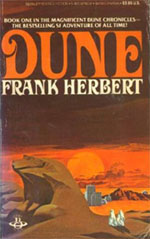 It’s interesting reading Dune immediately following a mass-reading of Vernor Vinge’s catalog, because both authors are essentially fascinated by post-humanity: Both see something essentially incomprehensible in the transhuman, but they approach it in different ways. Vinge chooses to approach it at oblique angles – from the POV of children; or on the rapid approach to it; or from a great distance; or through the lens of the primitive.
It’s interesting reading Dune immediately following a mass-reading of Vernor Vinge’s catalog, because both authors are essentially fascinated by post-humanity: Both see something essentially incomprehensible in the transhuman, but they approach it in different ways. Vinge chooses to approach it at oblique angles – from the POV of children; or on the rapid approach to it; or from a great distance; or through the lens of the primitive.
Herbert, on the other hand, tends to tackle the transhuman directly, but he does so from a fundamentally religious point of view.
To be clear on the distinction here: Vinge also equates transhumanity with godhood (the references to “Applied Theology” and “deicide”, for example, in A Fire Upon the Deep). But Herbert actually structures his narrative around a religious viewpoint – he couches his understanding of the transhuman through symbolism and prophecy; through divine mystery and ceremony.
Of course, the post-humanities of Vinge and Herbert are not exactly identical, either. But it would be interesting to see Vinge tackle Herbert’s thought (as expressed in an interview): “I had this theory that superheroes were disastrous for humans, that even if you postulated an infallible hero, the things this hero set in motion fell eventually into the hands of fallible mortals. What better way to destroy a civilization, society or a race than to set people into the wild oscillations which follow their turning over their critical judgment and decision-making faculties to a superhero?”
And it would be equally interesting to have seen Herbert tackle Vinge’s thesis: “Let an ultraintelligent machine be defined as a machine that can far surpass all the intellectual activities of any any man however clever. Since the design of machines is one of these intellectual activities, an ultraintelligent machine could design even better machines; there would then unquestionably be an “intelligence explosion,” and the intelligence of man would be left far behind. Thus the first ultraintelligent machine is the _last_ invention that man need ever make, provided that the machine is docile enough to tell us how to keep it under control. … It is more probable than not that, within the twentieth century, an ultraintelligent machine will be built and that it will be the last invention that man need make.”
But I digress.
For those of you completely unfamiliar with Dune, it may suffice to say that it is one of those works grouped with the Foundation Trilogy or The Lord of the Rings: A transformative and pivotal classic which cast a long shadow upon the entire genre from the moment it was published.
To understand how Dune achieved this stature, consider for the moment a seemingly simple question: What is the most impressive thing about Dune?
The trick is not in any particular answer. It is in the breadth of answers your question will provoke. Many people will point to the planet of Arrakis itself — painstakingly rendered and with a completely realized ecology. Others will point to the manipulation of prophecy. Or the action-packed battle sequences. Or the alien cultures. Or the evocative future history. Or the exploration of religious themes.
The story of Dune is a political thriller; it’s a character drama; it’s high tragedy; it’s mythological; it’s religious. And then Herbert tells it in the style of historical fiction within one of the most deeply realized science fiction settings ever realized on paper. It’s a gestalt creation.
And what do I, personally, find most impressive about Dune? The fact that Herbert successfully realized a story with the emotional depth and archetypal resonance of a Greek tragedy. I’ve probably read, watched, and listened to the Dune story more than two dozen times. And yet, every single time, there’s something fresh and new which can be gleaned from the experience.
GRADE: A+
For additional comments on Dune, which include SPOILERS, click here.
Frank Herbert
Published: 1965
Publisher: Ace
Cover Price: $7.99
ISBN: 0441172717
Buy Now!












